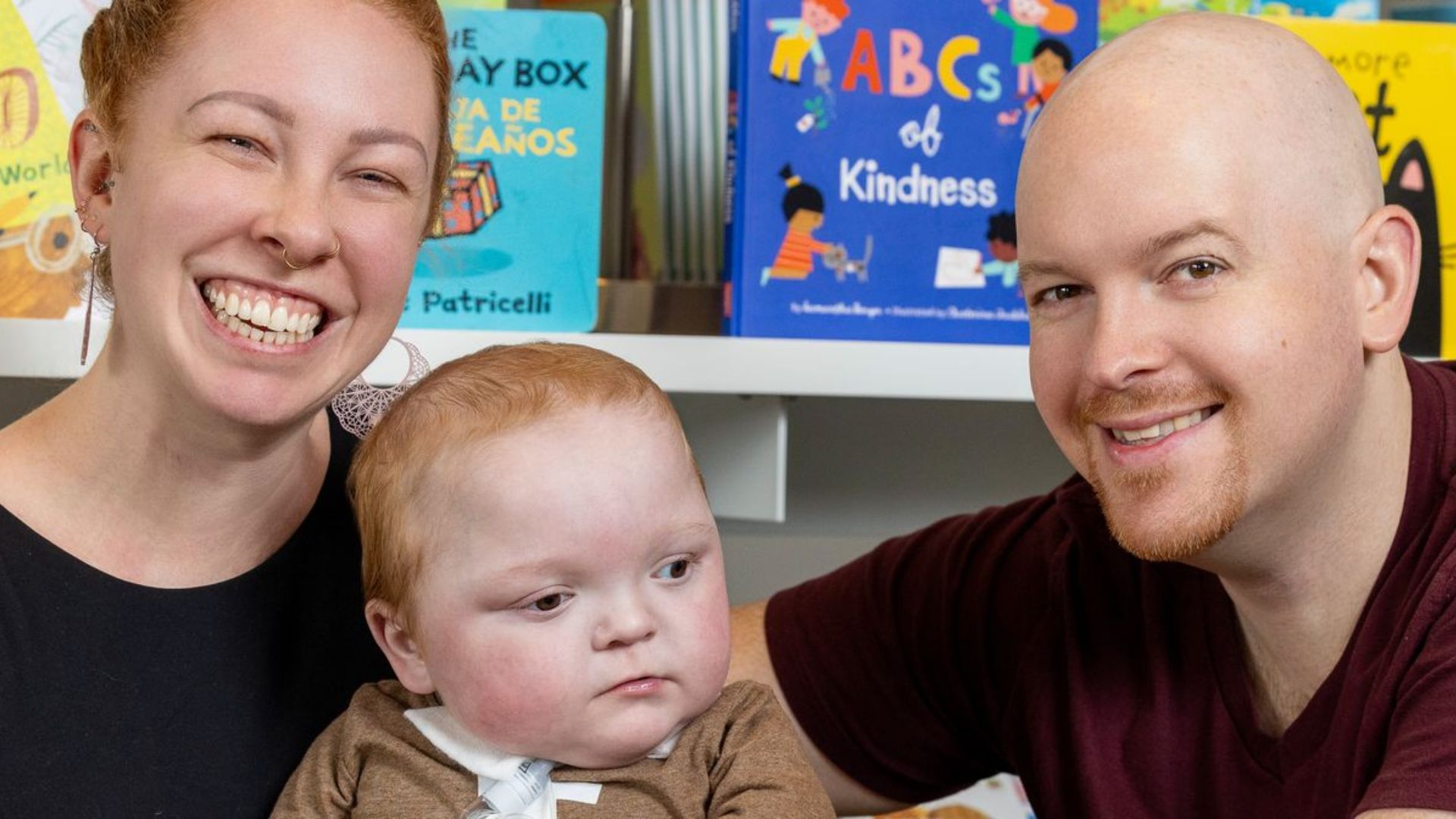Local News
Born at just one pound and eleven inches Levi Morris overcomes major health challenges to finally go home

Irondequoit, New York – In the quiet town of Irondequoit, New York, a miracle has been unfolding behind hospital walls for nearly a year and a half. This isn’t a story that begins and ends in a nursery or follows the typical path of first words and first steps. It’s a story that started with a terrifying medical emergency, continued through countless nights of uncertainty, and ended—at least this chapter—with a baby boy rolling through hospital halls to the sound of cheers, bubbles, and hope.
“This little boy has been through the ringer,” said his mother, Carrie Davids. “He is the strongest person I know, and he was only 1 pound six ounces and 11 inches when he was born.”
Carrie and her husband, Jon Morris, were expecting a February 2024 baby. Everything about Carrie’s pregnancy had seemed normal—until it wasn’t. One morning in November 2023, three months before her due date, Carrie woke up in excruciating pain. It turned out to be early-onset severe preeclampsia, a dangerous condition that can threaten both mother and baby. Carrie was rushed to Strong Memorial Hospital and admitted for monitoring.
“Things can change quickly, and being hospitalized allows for early intervention if necessary,” explained Dr. Neil Seligman, Professor in the Department of Obstetrics and Gynecology. But just four days into her stay, Carrie could no longer breathe, and Levi’s condition was rapidly deteriorating. A decision had to be made—and fast.
“While it’s always best for the baby to remain in utero for as long as possible, in this case Carrie’s health was in jeopardy because the preeclampsia was causing fluid to build up in her lungs while at the same time putting Levi’s health in jeopardy from restricted blood flow in the umbilical cord and growth restriction,” said Seligman.
That’s how Levi’s journey began—delivered via emergency C-section, thrust into the world far earlier than anyone had planned.
From the very beginning, Levi’s life was fragile. His lungs hadn’t fully developed, a common issue for extremely premature babies. He was immediately admitted to the NICU, where more than 1,200 babies are treated each year. But few stay as long or endure what Levi did.
In his very first week of life, Levi developed a blood clot along his PICC line—a complication that could have ended his life. Then came a roller coaster of lung treatments. He was intubated for 116 days, and one attempt to take him off the ventilator failed. When he was finally extubated, he was put on CPAP for three more weeks. Breathing, something most take for granted, was a daily battle.
Eventually, his medical team, including Dr. Patricia Chess, approached Carrie and Jon with the idea of a tracheostomy. The procedure would create a direct airway through the front of his neck to help him breathe more comfortably.
“This surgery would allow Levi more comfortable breathing and be better for him developmentally in the long run,” said Carrie. “So, we made the decision to go forward with it.”
The surgery marked a turning point, but the challenges didn’t stop. Pneumonia. Tracheitis. Repeated episodes of oxygen desaturation. For every small step forward, there seemed to be a new hurdle waiting.
“Sometimes we see babies go two steps forward, then three steps back in their health journey,” said Dr. Colby Day, NICU medical director. “But Carrie and Jon stayed optimistic. They tackled everything head on and firmly believed Levi would withstand the challenges. This family overcame so many obstacles, and it was a privilege to be part of Levi’s care.”
Supporting them was GCH’s Small Baby Program, which specializes in the care of infants born at less than 28 weeks or under 1000 grams. The program also focuses on parents, helping them participate in their baby’s care and become part of the medical team. And participate they did.
Carrie and Jon were relentless advocates for their son. As Carrie explained, “You have to determine how to best navigate the health system as a first-time parent. You have to decide how to best advocate for your child and how to do it in a positive and collaborative way.”
The couple planned to take Levi home in June 2024, then again in August. They trained on the necessary equipment, including a home ventilator. But each time, Levi wasn’t ready. One of the most harrowing moments came when he suffered a cardiac arrest and needed 16 minutes of CPR.
“That was a very scary time,” said Carrie. “Four to five times a day his heart rate would drop, and he would turn purple.”
Later, Levi was transferred to the Pediatric ICU (PICU), where his condition remained unpredictable. Lying on his back caused him to stop breathing. He experienced a terrifying paralysis before his first birthday that lasted more than a week. It took months to find the right ventilator settings.
“I think he was on every ventilator that Golisano Children’s Hospital owns at one point or another,” said Carrie.
It wasn’t until November 19, 2024—over a year after his birth—that Levi was able to use a portable ventilator and finally visit his home. Though he slept through meeting his two dogs, Dixie and Ruby, it was a monumental moment for his family.
“Levi’s condition was more severe than [that of] many of the children born at this early gestational age,” said Dr. Jill Cholette, medical director of the PICU. “We are delighted with the progress that Levi has made as he faced many ups and downs through the course of his hospital stay. He has a special family and parents who have done great under a stressful and challenging journey.”
This level of care couldn’t have happened without intense collaboration. Doctors from nearly every specialty—pulmonology, neonatology, cardiology, endocrinology, and more—worked together. Teams like the LINC group, led by Dr. Katie Palumbo, developed long-term care strategies tailored to Levi.
Equally vital were the support networks created by the hospital: NICU and trach buddies—other parents who had walked a similar path. And healthcare providers who didn’t just treat Levi, but supported his entire family.
“We provide the safest, highest-quality care in our NICU, PICU, and throughout Golisano Children’s Hospital,” said Dr. Jeffrey Meyers, associate chief quality officer. “Levi is still going to need a lot of care, but one of our major goals was to get him well enough to go home safely. That was an absolute team effort executed by so many physicians, nurses, therapists, care coordinators, multiple other providers, and his dedicated family.”
On February 26, 2025—471 days after his birth—Levi was finally discharged.
Staff lined the hospital halls. Bubbles floated through the air. Carrie and Jon, glowing with pride, pushed Levi in his stroller past the people who had become their extended family. This wasn’t just a medical victory. It was an emotional one.
“Levi’s homecoming is a long time coming,” said Carrie.
Though Levi still requires round-the-clock medical attention, including physical and occupational therapy and ongoing monitoring by multiple specialists, he’s now growing stronger in the comfort of his own home.
“Caring for a baby on a home ventilator takes an incredible amount of time and dedication,” said Laine DiNoto, leader of the Pediatric Tracheostomy/Ventilator Program at GCH. “When we think of kids who need support after birth, this kind of care does not immediately come to mind. But there are about 70 kids in our community alone who need this vital support. Achieving milestones is much harder for these babies, and providing appropriate care for them takes a special family. I am humbled to work with families like Carrie and Jon.”
Levi Morris is more than a patient. More than a tiny body with tubes and wires. He is, in every sense, a fighter. A symbol of perseverance, parental love, and the miracles modern medicine can achieve with the right people behind it.
His journey isn’t over. But now, it will be written not from a hospital bed, but from the comfort of his home. His laughter will echo down his own hallway. His milestones will be celebrated not just by doctors, but by grandparents, neighbors, and two very excited dogs.
Levi is, without a doubt, one of the Miracle Kids of 2025—and his story will inspire families, doctors, and anyone who believes in the extraordinary strength of a child who wasn’t supposed to survive, but did.
And he did it with courage, community, and the unbreakable bond of two parents who never gave up.

-

 Local News12 months ago
Local News12 months agoNew ALDI store close to Rochester to begin construction in late 2025 or early 2026
-

 Local News12 months ago
Local News12 months agoRochester Lilac Festival announces exciting 127th edition headliners
-

 Local News10 months ago
Local News10 months agoCounty Executive Adam Bello and members of the county legislature celebrate exceptional young leaders and advocates at the 2025 Monroe County Youth Awards
-

 Local News10 months ago
Local News10 months agoThe 2025 Public Market Food Truck Rodeo series will begin this Wednesday with live music by the Royal Bromleys